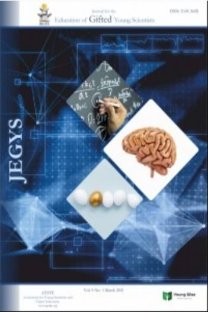Career Decision Making Self-Efficacy (CDMSE) among Gifted and Talented Students in Malaysia: An Initial Demographic Study
Career counseling, CDMSE, gifted and talented students, Malaysia,
___
- Abidin, M.H.Z., Amat, S., Subhan, M., Mahmud, M.I., Ali, S., & Bakar, A.Y.A. (20018). Career maturity among gifted and talented students in Malaysia. International Journal of Engineering and Technology (UAE), 7, 2, 74-75.
- Bakar, A.Y.A. (2017). Developing gifted and talented education program: The Malaysian experience. Creative Education, 8, 1-11.
- Bakar, A.Y.A. (2016). Counseling and guidance for Malaysian gifted students: A conceptual framework. Journal for the Education of Gifted Young Scientists, 4, 1, 21-29.
- Bakar, A.Y.A. & Zakaria, Z. (2018). Counselling services for gifted students: A qualitative exploration. International Journal of Engineering and Technology (UAE), 7, 2, 66-69.
- Bandura, A. (1997). Self-Efficacy: The Exercise of Control. New York, NY: Freeman.
- Bandura, A. (1086). Social Foundations of Thought and Action: A Social Cognitive Theory. Englewood Cliffs, NJ: Prentice-Hall.
- Betz, N.E., Klein, K.L., & Taylor, K.M.. (1996). Evaluation of a short form of the Career Decision-Making Self-Efficacy Scale. Journal of Career Assessment, 4, 1, 47-57.
- Colangelo, N., & Wood, S. (2015). Counseling the gifted: Past, present, and future directions. Journal of Counseling & Development, 93, 2, 133-142.
- Emmet, J.D., & Minor, C.W. (1993). Career decision-making factors in gifted young adults. The Career Development Quarterly, 41, 4, 350-366.
- Gagné, F. (2004). A Differentiated Model of Gift and Talent (DMGT). Personal Notes, 1-3.
- Ishak, N.M., & Bakar, A.Y.A. (2017). Identification process of young gifted learners: The Malaysian experience. Journal for the Education of Gifted Young Scientists, 5, 2, 71-81.
- Ishak, N.M., & Bakar, A.Y.A. (2014). Counseling services for Malaysian gifted students: An initial study. International Journal for the Advancement of Counselling, 36, 4, 372-383.
- Kerr, B.A. (1981). Career education strategies for the gifted. Journal of Career Education, 7, 318-324.
- Marshall, B.C. (1981). Career decision making patterns of gifted and talented adolescents: Implications for career education. Journal of Career Education, 7, 305-310.
- Super, D.E. (1957). The Psychology of Careers: An Introduction to Vocational Development. Oxford, UK: Harper & Bros.
- Wood, S. (2010). Best practices in counselling the gifted in schools: What’s really happening? Gifted Child Quarterly, 54, 1, 42-58.
- Başlangıç: 2013
- Yayıncı: Genç Bilge Yayıncılık
Andi THAHİR, Anisa MAWARNİ, Ranta PALUPİ
Rizhal RİSTANTO, Puji LESTARİ, Mieke MİARSYAH
Rahmi RAMADHANİ, Rofiqul UMAM, Abdurrahman ABDURRAHMAN, Muhamad SYAZALİ
İda UMAMI, A GANİ, Tejo WASKİTO
Chokchai YUENYONG, Saranya WONGSİLA
Anisa Fatkhul JANNAH, Rully Charitas İndra PRAHMANA
Yusmansyah YUSMANSYAH, Diah UTAMİNİNGSİH, Muswardi ROSRA, Redi EKA ARDİYANTO, Citra ABRİANİ MAHARANİ, Novinta NURULSARİ
